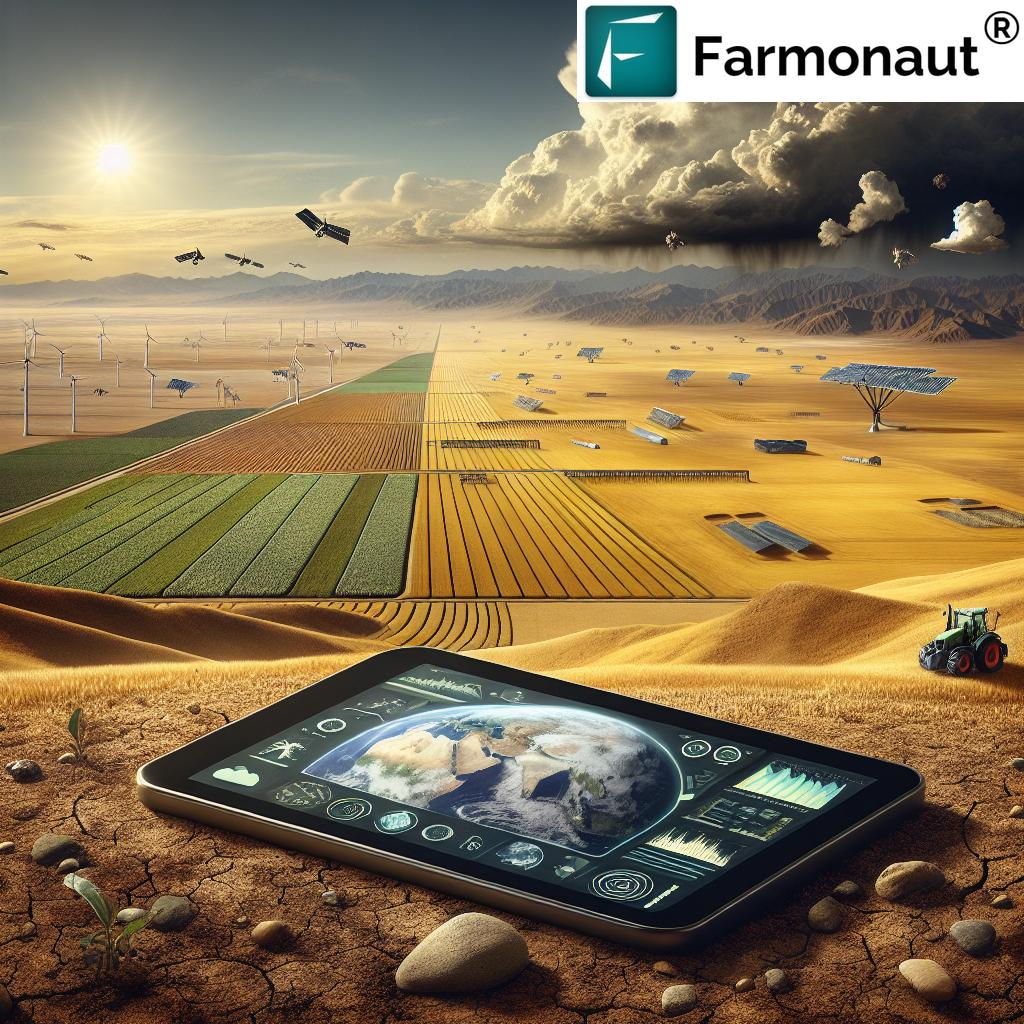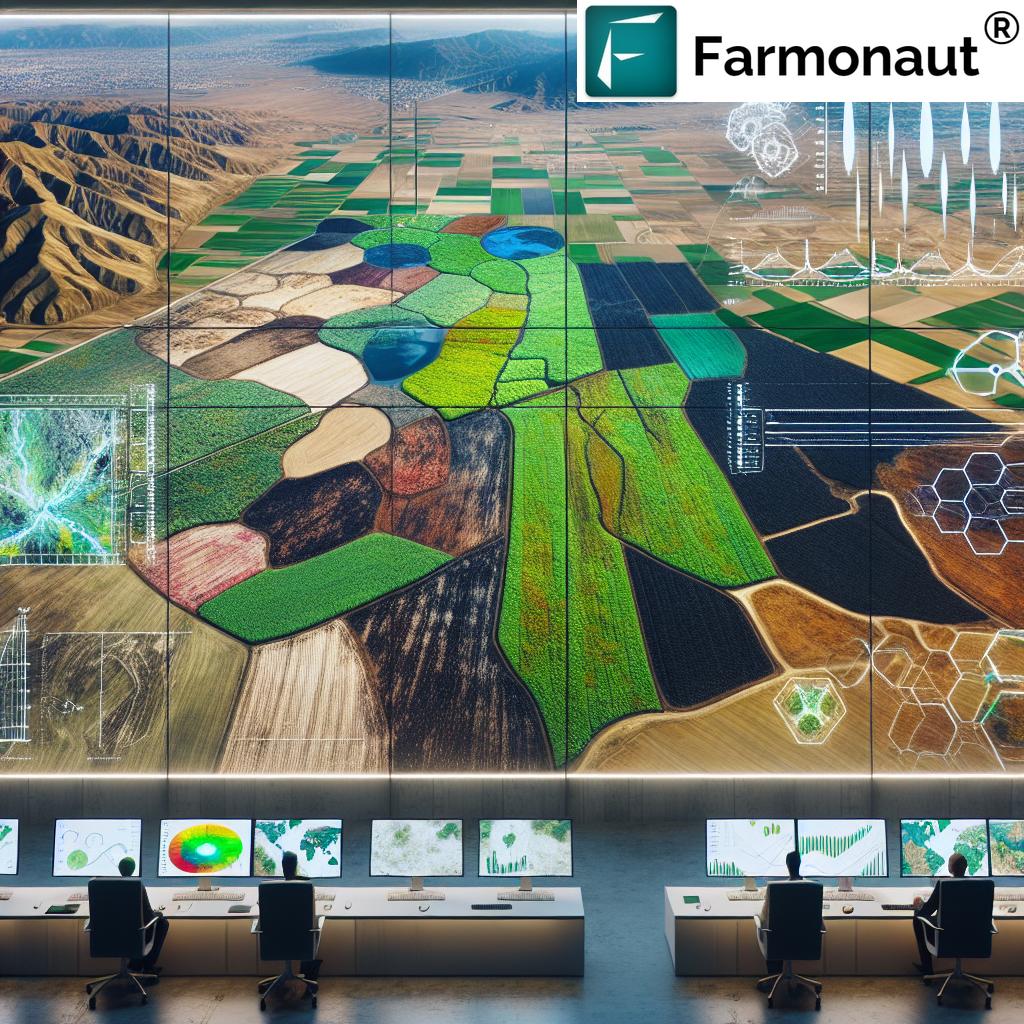Sustainable Agriculture in Central Asia: How Farmonaut’s Digital Technologies Combat Climate Change and Land Degradation

“COP29 in Baku addressed sustainable agriculture challenges across 3 regions: Central Asia, the Caucasus, and arid areas.”
In the face of pressing global challenges, sustainable agriculture has emerged as a critical focus for regions grappling with the dual threats of climate change and land degradation. At the forefront of this battle, Central Asia, the Caucasus, and arid regions are seeking innovative solutions to safeguard their agricultural future. As we delve into the outcomes of the recent COP29 discussions in Baku, Azerbaijan, we’ll explore how digital technologies, particularly those offered by Farmonaut, are revolutionizing farming practices and contributing to climate change mitigation efforts.
The Urgency of Sustainable Agriculture in Central Asia
Central Asia, with its vast steppes and varied climates, has long been an agricultural powerhouse. However, the region now faces unprecedented challenges due to climate change and unsustainable farming practices. The recent roundtable at COP29 highlighted the urgent need for international cooperation to address these issues.
- Increasing frequency and severity of droughts
- Accelerating desertification
- Threats to water resources and biodiversity
- Food security concerns
These challenges call for a paradigm shift in how we approach agriculture in the region. As representatives from various countries and international organizations gathered, the consensus was clear: sustainable agriculture is not just an option; it’s a necessity for the survival and prosperity of Central Asian nations.
Climate Change Mitigation: A Priority for Central Asian Agriculture
At the heart of the discussions was the need for robust climate change mitigation strategies tailored to the unique conditions of Central Asia. Experts emphasized the importance of adopting climate-smart farming practices and leveraging modern technologies to enhance agricultural adaptation.
Here’s a comprehensive look at the key mitigation strategies discussed:
| Mitigation Strategy | Environmental Impact | Implementation Challenges | Farmonaut’s Solution |
|---|---|---|---|
| Water Resource Management | Potential 30% reduction in water usage | Lack of real-time data on water availability | Satellite-based soil moisture monitoring |
| Soil Fertility Improvement | Up to 20% increase in carbon sequestration | Limited access to soil health information | AI-driven soil analysis and recommendations |
| Precision Agriculture Technologies | 15-20% reduction in fertilizer and pesticide use | High initial costs for small-scale farmers | Affordable satellite-based crop health monitoring |
| Modern Irrigation Systems | 40-50% increase in water use efficiency | Complex implementation in traditional farming setups | Integration with Farmonaut’s water management tools |
| Climate-Smart Farming Practices | Potential 25% reduction in GHG emissions | Resistance to change traditional methods | Personalized AI advisory for climate-adaptive farming |
These strategies form the backbone of sustainable agriculture efforts in Central Asia. However, their successful implementation relies heavily on the adoption of digital technologies and precision agriculture tools.
Farmonaut: Pioneering Digital Solutions for Sustainable Agriculture
In the quest for sustainable agricultural practices, Farmonaut emerges as a game-changer. Our advanced remote sensing and GIS technologies align perfectly with the global efforts discussed at COP29, offering farmers innovative tools to implement climate change mitigation strategies and improve resource efficiency in agriculture.
Here’s how Farmonaut is addressing the key challenges:
- Satellite-Based Crop Health Monitoring: Our technology provides real-time insights into vegetation health, soil moisture levels, and other critical metrics. This data is crucial for optimizing irrigation and reducing water waste.
- AI-Powered Advisory System: Jeevn AI, our personalized farm advisory tool, delivers tailored insights and expert crop management strategies, helping farmers adapt to changing climate conditions.
- Resource Management Tools: Our platform offers solutions for efficient fleet and resource management, crucial for large-scale agricultural operations looking to reduce their carbon footprint.
- Carbon Footprint Tracking: We provide real-time data on emissions, allowing agribusinesses to take concrete steps towards sustainability and compliance with environmental regulations.
Combating Land Degradation with Precision Agriculture
Land degradation is a critical issue in Central Asia, with approximately 40 percent of the world’s land resources in decline. This crisis jeopardizes ecosystems, food security, and water availability. Farmonaut’s precision agriculture technologies offer a powerful solution to this challenge.
“Farmonaut’s remote sensing and GIS technologies support 4 key areas: water management, soil fertility, food security, and climate adaptation.”
Our satellite-based monitoring systems provide farmers with detailed insights into soil health, allowing for targeted interventions to prevent further degradation. By optimizing resource use and promoting sustainable farming practices, we’re helping to reverse the trend of land degradation across the region.
Water Resource Management: A Critical Challenge
In arid and semi-arid regions of Central Asia, efficient water management is paramount. The COP29 discussions emphasized the need for modern irrigation systems and smart water use strategies. Farmonaut’s technology plays a crucial role in this area:
- Real-time soil moisture monitoring
- Precision irrigation recommendations
- Early detection of water stress in crops
By providing farmers with accurate, timely data on water needs, we’re helping to conserve this precious resource while maintaining optimal crop health.
Explore Farmonaut’s API for advanced water management solutions
Enhancing Food Security through Digital Transformation
Food security remains a top priority for Central Asian nations. The digital transformation of agriculture, as discussed at COP29, is key to addressing this challenge. Farmonaut’s technologies contribute significantly to enhancing food security by:
- Improving crop yields through precise management
- Reducing crop losses due to pests and diseases
- Optimizing resource use for sustainable production
Our AI-driven insights help farmers make informed decisions, leading to more resilient and productive agricultural systems.
Climate-Smart Farming: Adapting to Changing Conditions
As climate patterns shift, farmers in Central Asia need to adapt quickly. Climate-smart farming practices, supported by digital technologies, are essential for maintaining productivity in the face of environmental challenges. Farmonaut’s platform offers:
- Customized crop recommendations based on climate forecasts
- Early warning systems for extreme weather events
- Long-term planning tools for climate adaptation
By leveraging our advanced analytics, farmers can stay ahead of climate-related risks and optimize their operations for changing conditions.
International Cooperation and Technology Transfer
The COP29 roundtable highlighted the importance of international cooperation in addressing agricultural challenges. Farmonaut is at the forefront of this effort, facilitating technology transfer and knowledge sharing across borders. Our platform provides:
- Standardized data collection and analysis methods
- Cross-border collaboration tools for researchers and policymakers
- Access to global best practices in sustainable agriculture
By fostering international cooperation, we’re helping to accelerate the adoption of sustainable farming practices throughout Central Asia and beyond.
Green Energy Solutions in Agriculture
The transition to green energy is a crucial component of sustainable agriculture. At COP29, experts explored opportunities for integrating renewable energy sources into farming operations. Farmonaut supports this transition by:
- Providing data on optimal locations for solar and wind installations on farmland
- Offering energy consumption analysis for agricultural operations
- Recommending energy-efficient farming practices
By helping farmers reduce their reliance on fossil fuels, we’re contributing to the overall reduction of agriculture’s carbon footprint.
The Role of Blockchain in Sustainable Agriculture
Blockchain technology emerged as a promising solution for enhancing transparency and traceability in agricultural supply chains. Farmonaut’s blockchain-based traceability system offers:
- End-to-end tracking of agricultural products
- Verification of sustainable farming practices
- Enhanced trust between producers and consumers
This technology not only supports sustainable agriculture but also helps farmers access premium markets for their environmentally-friendly products.
Implementing Sustainable Agriculture: Challenges and Solutions
While the path to sustainable agriculture is clear, implementation faces several challenges. Farmonaut addresses these challenges head-on:
- Challenge: Limited access to technology for small-scale farmers
Solution: Affordable, user-friendly mobile applications - Challenge: Lack of technical expertise
Solution: AI-powered advisory systems and intuitive interfaces - Challenge: Resistance to change traditional practices
Solution: Demonstration of tangible benefits through data-driven insights
By providing accessible, practical solutions, we’re helping farmers of all scales transition to more sustainable practices.
The Future of Sustainable Agriculture in Central Asia
As we look to the future, the role of digital technologies in sustainable agriculture will only grow. Farmonaut is committed to continual innovation, ensuring that our solutions evolve to meet the changing needs of farmers and the environment. We envision a future where:
- Precision agriculture is the norm, not the exception
- Data-driven decision-making leads to optimal resource use
- Sustainable practices contribute significantly to climate change mitigation
By partnering with Farmonaut, farmers, agribusinesses, and policymakers in Central Asia can lead the way in creating a more sustainable and resilient agricultural sector.
Conclusion: Embracing Digital Solutions for a Sustainable Future
The discussions at COP29 in Baku have set the stage for a new era of sustainable agriculture in Central Asia. By embracing digital technologies like those offered by Farmonaut, the region can effectively combat climate change, reverse land degradation, and ensure food security for future generations.
We invite you to join us in this journey towards sustainable agriculture. Whether you’re a small-scale farmer, a large agribusiness, or a policymaker, Farmonaut’s solutions can help you make a positive impact on the environment while improving agricultural productivity.
Ready to transform your agricultural practices? Explore Farmonaut’s solutions today and be part of the sustainable agriculture revolution in Central Asia and beyond.
Check out our API Developer Docs for integration options
Frequently Asked Questions
Q: How does Farmonaut’s technology help combat climate change in agriculture?
A: Farmonaut’s satellite-based monitoring and AI-driven insights help farmers optimize resource use, reduce water waste, and implement climate-smart practices, all of which contribute to reducing agriculture’s carbon footprint.
Q: Can small-scale farmers in Central Asia afford Farmonaut’s solutions?
A: Yes, Farmonaut offers affordable, scalable solutions designed to be accessible to farmers of all sizes, including small-scale operations in Central Asia.
Q: How does Farmonaut address water scarcity issues in arid regions?
A: Our technology provides real-time soil moisture data and precision irrigation recommendations, helping farmers use water more efficiently and reduce waste in water-scarce areas.
Q: What role does blockchain play in Farmonaut’s sustainable agriculture solutions?
A: Farmonaut uses blockchain technology to enhance traceability in agricultural supply chains, verifying sustainable practices and building trust between producers and consumers.
Q: How can policymakers use Farmonaut’s data to support sustainable agriculture initiatives?
A: Policymakers can leverage Farmonaut’s comprehensive agricultural data to inform decision-making, monitor the effectiveness of sustainability programs, and target resources where they’re most needed.







